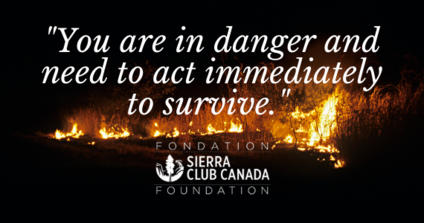
This is the first line in a message being sent by emergency services to those who refuse to leave their homes as the Australian bushfires approach.
Ecologists from the University of Sydney are estimating 480 million animals have now been killed by fires ignited by climate change. As firefighters and other emergency responders - including some very brave Canadians - continue courageously to battle the fires and rescue those fleeing them, the number of human lives lost is not yet fully known.
Making way fewer headlines over the holidays was the approval by Canada’s Minister of Environment and Climate Change of a new offshore exploration drilling project at the Flemish Pass oil lease, located 400 km east of St. John’s, Newfoundland.
Like Canada, Australia's leaders have clung for decades to the identity of being fossil fuel producers – in their case mostly coal and gas - and allowed the fossil fuel industry to fan the flames of existing political divisions to stymy strong climate commitments and action.
As a case in point: our federal and provincial leaders are quietly paving the way for offshore drilling projects off Canada’s East Coast by making it easier and faster for exploratory drilling projects to get approved.
Nationally, the petroleum industry and its allies are fanning the flames of political disunity to protect oil and gas interests - a particularly volatile tactic given the climate crisis and the rise of nationalism worldwide.
It appears that even in the face of cataclysmic fires, loss of human life, and extinction of species, our leaders still cling to the myth that the fossil fuel industry is their best hope of sustaining their economies and balancing the books. In the case of Newfoundland and Labrador, the Muskrat Falls economic boondoggle and an aggressive fossil fuel lobby is motivating politicians to remain cheerleaders for reckless fossil fuel expansion, all while the world burns.
The Flemish Pass exploration project itself has a timeline of eight years. If they begin producing oil, projects like this have a lifespan on the order of decades. It will lock in dangerous ghg emissions and waste precious time needed to transition away from fossil fuels and to seek safer ground upon which to build our communities.
The planned doubling of oil and gas production off Newfoundland and Labrador would produce 14% of global greenhouse gas emissions needed to keep us below 1.5 degrees Celsius. Newfoundland and Labrador’s stated production targets will result in oil and gas sector activities (not counting burning the oil they produce) making up 71% of the province’s 2030 emission target of 6.9 MT (see here for a great account of the province’s climate non-plan.)
The Australian fires graphically illustrate how climate change is a death sentence for millions of animals and plants that make up the diversity of life. As you know, we also are deeply concerned that regulation of our offshore oil and gas industry is inadequate to ensure we protect special places like the Gulf of St. Lawrence and stop the extinction of endangered whales. Twelve municipalities in Nova Scotia have called for a public inquiry into how the offshore oil and gas industry is regulated because they are concerned about threats to coastal communities by poor regulation. [i]
There is no reasonable method to contain an oil spill in Atlantic Canada’s offshore region. And chemical dispersants, if permitted as part of a spill response, would make the contamination to marine life even worse.
Minister Wilkinson's approval places no limit to the greenhouse gas emissions the Flemish Pass project can produce. With this approval, and moves to accelerate drilling off Newfoundland, there is no indication that politicians are listening to emergency warnings from the global scientific community and being held up to them by calls to action from Indigenous and youth leaders.
Even though there are literally millions rallying around the world, ringing the alarm bells for climate action.
Like those Australians who left their homes to get to safety before it was too late, our leaders need to abandon the false comfort of fossil fuel company boardrooms. They need to carefully dismantle regulatory processes weighted toward inevitable approvals that disregard the climate catastrophe they inflame. They need to gather their courage, reach across political divides, and secure the necessary resources to start making strategic plans for responding to the climate emergency.
As Canadian firefighters are rushing to help put out the fires in Australia and people wait on beaches for rescue, the very least we can do here at home is to not add more fuel to these terrible fires by approving more oil and gas projects.
We are in danger and need to act immediately to survive.
Let’s start acting like it.
. . . . .
[i] On December 20th, the Terra Nova drilling platform had to halt production because back-up fire safety equipment was found to be inadequate by the Canada-Newfoundland and Labrador Offshore Petroleum Board. In November 2018, the largest spill in Newfoundland’s offshore oil and gas industry occurred as Husky Energy – attempting to re-attach a wellhead in 28-foot waves - spilled an estimated 250,000 litres of crude oil. Not a single drop of oil was recovered, no summary of the ecological impacts of the spill produced (such as estimates of dead seabirds and impacts on marine mammals), and we are still waiting to hear if and how Husky will be held accountable.
